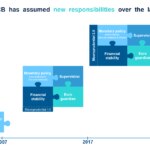"The ECB played a fundamental role in the crisis"
The role the European Central Bank played during the crisis was fundamental to the European economy getting off the ground, according to José Manuel González-Páramo. He experienced part of this process firsthand as a member of the ECB Executive Board and Governing Council from 2004 to 2012. He is currently BBVA’s Executive Director.

The duration and depth of the recent economic and financial crisis forced European institutions to make urgent decisions in unchartered territory. Now that the eurozone has found its way back to growth, looking back, “the ECB played a fundamental role during the crisis,” José Manuel González-Páramo affirmed on Friday in Santander. BBVA’s Executive Director is participating in a seminar on the future of the eurozone, organized by the Menéndez Pelayo International University (UIMP). Renowned European figures are participating in the event in remembrance of Professor Jean-Paul Abraham’s contribution to monetary integration studies.

José Manuel González-Páramo at Menéndez Pelayo International University.
In terms of the main challenges from the past decade, BBVA’s Executive Director referred to the banking crisis, the sovereign debt crisis, the risk of break-up of the euro, and finally, the risk of deflation as the shocks that put Europe’s back to the wall. Europe was able to sail through this “perfect storm” thanks in part to the new responsibilities that the European Central Bank had to take on, he explained. It not only became the only supervisor of eurozone banks, but also spearheaded unconventional monetary policy measures some of which were considered controversial.
- New liquidity measures, such as the long-term refinancing lines for banks, LTRO and TLTRO.
- Maintaining Greek banks’ liquidity through an emergency credit line to prevent a systemic crisis - known as Emergency Liquidity Assistance (ELA) – amid fear that Greece may leave the Economic and Monetary Union.
- Joining coordinated action with other central banks to lower interest rates on October 8, 2008.
- Offering liquidity in foreign currencies as a way to prevent systemic risk and limit spillover to the main currencies.
- Launching an asset purchasing program “Securities Markets Programme” (SMP) in May 2010 to guarantee liquidity in the debt markets and restore the effectiveness of monetary policy transmission.
- Also creating the massive public debt buying program “Outright Monetary Transaction” (OMT) to safeguard the integrity of the euro.
- Lowering official interest rates to 0% and putting the deposit facility in negative territory (-0.40%) for the first time in history.
- Starting to buy corporate debt and later on public debt as well through the program “Asset Purchase Programme” (APP).
Now the ECB is a step away from removing these stimuli, as the U.S. Federal Reserve has done. He feels that the ECB is being “more cautious” than the Fed in the monetary policy normalization process. In his opinion, it should proceed with a gradual and orderly withdrawal, and make significant communication efforts to mitigate possible shocks.
In terms of eurozone bank supervision, he pointed to two crucial challenges for the ECB in the short-term. First, harmonizing regulatory and supervisory practices and second, ensuring the viability of the institutions’ business models. In both cases he suggested strengthening European coordination among institutions so that the ECB does not run the risk of losing its credibility and assuming responsibility for future banking failures.
He also reviewed the new sources of systemic risk for financial stability, such as shadow banking, cyberattacks and new digital players who have broken into the financial business (fintech). In order expand the macro-prudential tools, he feels that a single macro-prudential authority for the eurozone would be a good solution in the long-term.

Graphic about BCE's responsabilities of José Manuel Gónzalez-Páramo in UIMP
The future role of ECB
Finally, he reflected on the future role of the ECB in the eurozone, taking into account the priorities the European Commission recently proposed. In the short-term, this European institution suggests breaking the vicious circle between sovereign risk and banks in three ways: reducing banks’ non-performing loans; finalizing the banking union with public backstop for the Single Resolution Fund and a European Deposit Insurance System (EDIS); and completing the Capital Markets Union.blanca
In the medium-term, the European Commission proposes evolving the way banks’ sovereign exposure is treated to create a new, safe asset in Europe that can also serve as an instrument to promote monetary policy. Another challenge in sight is making progress in the fiscal union, creating a eurozone Treasury with the competency to manage a common budget, issue debt and have a European monetary fund. For José Manuel González-Páramo, a common fiscal policy would help to discharge the ECB of some of the responsibilities it took on during the crisis.
To conclude, BBVA’s Executive Director warned that despite the fundamental role that the ECB has played to date to protect the euro from market attacks, it cannot act alone to ensure the integrity of the European project. Strengthening the legal and institutional framework is therefore necessary to build a Europe that is more resilient to future challenges, he maintained.